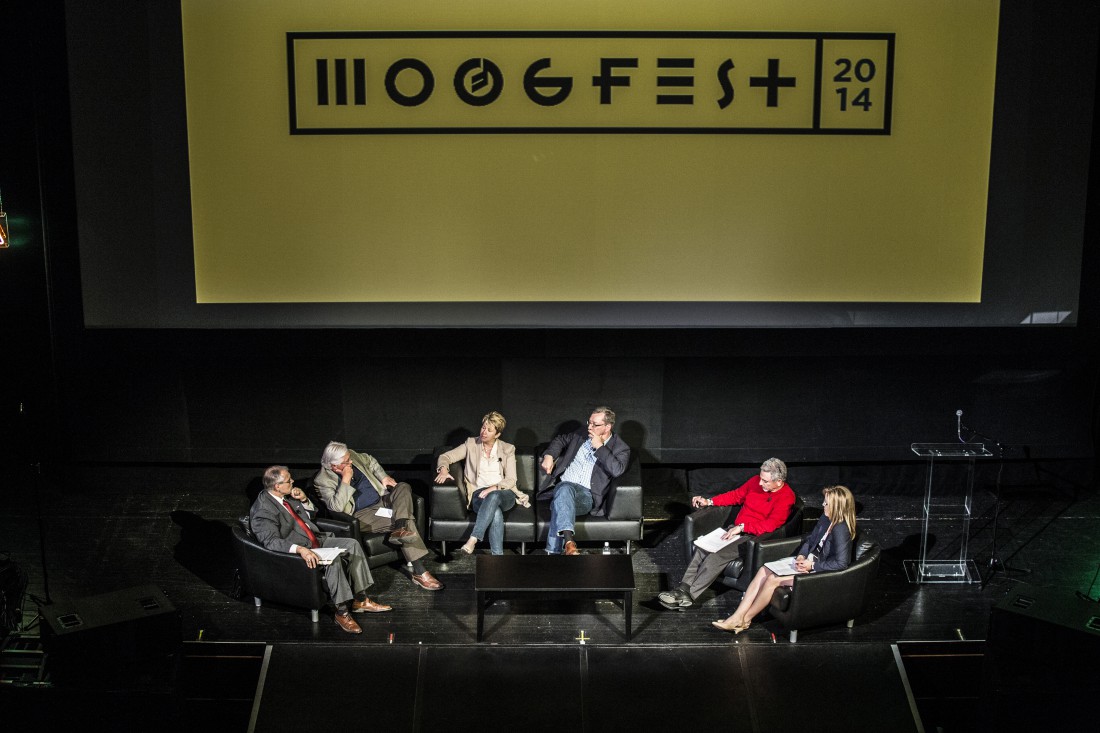On Tuesday, May 20, Buncombe County will consider a request from Moogfest for $250,000 in public funding to produce the technology, art and music festival again next year.
This year’s festival took place April 23-27, aided by a Buncombe County economic development grant of $90,000. The city of Asheville also chipped in $90,000 in funding. But the majority of the 2014 festival’s $2.74 million price tag was privately funded. The event lost more than $1.5 million this year, according to Moogfest’s new grant application for county funding.
Moogfest started calling Asheville home in 2010, but organizers pitched this year’s version as a revamped event focusing on cultivating economic development. That was the successful argument behind their push for government funding this year – the first time it received such money. Festival owner Mike Adams told the Buncombe County Board of Commissioners in March that he estimated the festival would generate $30 million for the local economy and bring in $238,000 in tax revenue, more than paying back the county grant.
His company’s new grant application doesn’t provide data on the festival’s economic impact. Moogfest is working with the Economic Development Coalition for Asheville-Buncombe County to produce a detailed impact assessment. It should be ready in early June, according to festival spokesperson Jill Lieberman.
Meanwhile, Adams, who also serves as president of Moog Music, the local instrument business, said at several public events he didn’t expect this year’s venture to be profitable, calling it an investment in the future. Ashley Capps, who produced three previous versions of the festival as well as a similar event called Mountain Oasis Electronic Music Summit, said that only one of those four events was profitable. He decided in March to discontinue producing such local events.
However, Moogfest’s latest grant application paints a sunny picture of the event and its future.
“By all accounts the most recent transformation of Moogfest was a success from many important aspects,” it states, citing its triumphs attracting attendees who have the means to invest in the local area, and “the world’s media” that presented Asheville in “a very positive way” as well as “large corporate sponsors who we hope will invest in the event in a meaningful way in coming years.” A survey of VIP attendees showed that 57 percent earn more than $100,000 a year and 52 percent work in the technology sector.
The application specifically reports that, “as a result of the success of the first year event, we have seven legitimate candidates interested in underwriting: Google, SAS, Microsoft, Red Hat, IBM, Samsung and Intel.” It also reports that organizers are “confident” they can cut at least $300,000 in expenses next year through “efficiencies associated with managing this event for a second time.”
Moogfest’s ultimate aim is to “raise the standard of living for every household in Buncombe County,” according to the application. “Moogfest is loosely based on SxSW, which has directly contributed to the 28.5 percent GDP growth in the Austin area since 2008. … Moogfest brands Asheville and by association the state with a cool factor that other areas of the country would have a very difficult time matching. This gives our area a unique competitive advantage when it comes to attracting and recruiting new technology firms to the area.”
Moogfest is the only for-profit venture requesting a Buncombe County Community Development Fund Grant this year. It’s also among the top-three biggest requests of the 19 organizations applying for such funds. Others include Asheville Art Museum ($2.86 million) Pack Place Education, Arts & Science Center ($409,076), Asheville GreenWorks ($50,000), Asheville Area Arts Council ($42,000) and Asheville Buncombe Regional Sports Commission ($45,000). Excluding the Moogfest proposal, which was submitted after applications from other organizations were already initially evaluated, the total requests add up to more than $3.73 million. However, it’s unlikely the county will approve anything close to that amount: Buncombe County Manager Wanda Greene recommends that the county give a total of only $487,102 to the requesting organizations. For example, she recommends that the county not give the Asheville Art Museum any of the $2.86 million it’s requesting.
The Moogfest grant application will be considered by the Buncombe County Culture Recreation Authority Tuesday, May 20, at 3 p.m. in Pack Memorial Library (67 Haywood Street in downtown Asheville). The public is welcome to attend and voice opinions during the public comment period.
Empowered by a new state law, Buncombe commissioners created the new government agency last year to oversee the county’s libraries, parks and recreation facilities as well as work with related community partners. A special 3.5 cent property tax funds the body and its charged with drafting its own budget. However, that budget – whether it includes the Moogfest funding or not — will ultimately have to be approved by the commissioners before the start of the next fiscal year on July 1.
Read the entire Moogfest Grant Application.




A pretty egregious waste of money, considering the turnout, especially of locals. I was at half empty shows by Kraftwerk, a nearly empty free music stage on Lexington, and some nearly empty musical showcases that should’ve been packed. I think the problem is a disconnect between the musical bookings and what audiences want in the South. There was way too much of an emphasis on DJs and underground beats and rap. It’s a stretch to think there’d be an interest in this music from a city pretty grounded in roots-Americana-jam band music. I think MoogFest made a big mistake in partnering with Detroit’s Paxahau, who clearly are the one’s who booked so many DJs. I’m a big fan of DJ culture, but it’s just not a good fit for this town. MoogFest was way too ambitious in its bookings and should’ve kept it very low budget and organic. SXSW didn’t start out with a big splash, it grew slowly. I’d say, scale it down and get away from the focus on DJs and purely electronic music.